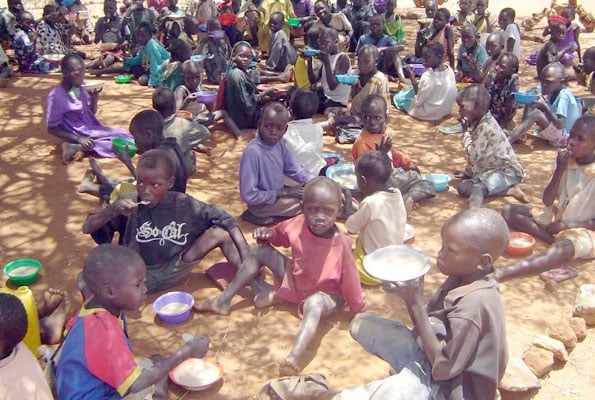Prime
who will break The School feeding policy jinx?

Pupils of Loodoi Primary School in Moroto District eat porridge during break time. According to the Education Act 1998, all stakeholders are responsible for the feeding of school children. FILE PHOTO
What you need to know:
What to do. In order to fix poor performance in schools and proper growth of children, a section of stakeholders say focus should be put on the school feeding issue.
For children to learn effectively, they must feed well, experts have argued. Nutritionists and health experts say it not just a meal students need but regular and balanced feeding including breakfast before they leave home or break tea for at school.
Students also need lunch and dinner. But for many of Uganda’s eight million Primary School going children and about half a million in secondary schools a regular meal of any type at school is a farfetched a dream.
Educationists argue that lack of a midday meal contributes significantly to poor results—this applies to both learners and their teachers but since teachers earn a salary, the greater focus is on the learners.
On November 22, the Uganda National Teachers Union (Unato) released a draft report on a survey on viable school feeding programme it conducted in at least 100 schools across the country in collaboration with both ActionAid International Uganda and President’s Office.
Some of the findings are staggering, especially what is construed to mean a meal where an attempt is being made to follow the advice of packing something to eat from home.
But critics of the approach say may actually erode the gains made in accessibility and won’t help efforts towards achieving quality. “Do you know that 21 of our girls got pregnant in one term and it was always during lunch time when they had gone back for lunch,” Deborah Akwi, a teacher from Kumi, said during a meeting in which Unatu presented their report findings.
During the research that was conducted in 70 UPE schools and 30 USE schools in 10 districts in different regions in the country, Unatu discovered that, irrespective of consistence and quality, 42 per cent of the UPE schools and over 79 per cent of USE schools had a daily meal in any form respectively. But the most common form of “lunch” across the country in the report was that “children go home for lunch.”
Peace, a senior two student also from Kumi who presented a poem reminding the nation of promises made over 10 years ago, jerked the audience back to reality when she asked if anyone knew or cared to know what happens to the children when they claim to have gone for lunch.
Above 50 percent in half the regions Unatu visited reported “going back home for” lunch with West Nile topping at about 90 percent. While some NGO’s already provide some food at school, especially in conflict areas like northern Uganda and Karamoja region overall the idea is yet to be embraced across the country. Other NGOs said they were deliberately experimenting on the idea to see how it links with improvement in performance and early results had indicated a close correlation.
What it takes to feed a child with a basic meal of posho and beans. Head teachers who provided some form of meal said they needed only Shs33,000 to feed a primary school child for a term and about Shs23,000 for a secondary school child—the figure was disputed in the meating as being too low.
And on the question of what is standing in the way of a government-led initiative to provide the meal, resource constraints were raised. But can parents contribute? Yes, the report found out. But would it be the politically correct thing, No, the same report says.
Testimonies were adduced to show that in areas where parents and the schools had mobilised to provide some money for lunch, a section of parents objected saying government was offering free education and parents were therefore not obliged to contribute anything. In other cases, Resident District Commissioners were blamed for politicising the matter claiming that any attempt to ask parents to pay money, however small was an attempt at sabotage to re-introduce school dues.
“Is it government that produced the children, no. So why don’t parents feed their own children. Do you have to be forced to feed your own child,” asked Vasco Kura, coordinator of education services in the Anglican Church in Uganda..
The commissioner for Basic and Secondary Education, Dr Yusuf Nsubuga, said the Education Act 1998 sets it clearly that all stakeholders are responsible for the feeding children and so everyone should play their role but not change policy.
“We should not hide under the law; all we have to do is to make sure that the parents make voluntary contributions towards the wellbeing of the children, should we be forced to feed our own children?” Dr Nsubuga said.
Unatu General Secretary Teopista Birungi urged teachers to come out and challenge the policies by empowering the parents with different ways through which they can feed their children depending on the region saying that since the law is already in place, it is now the teachers to fight for the plight of children.
“All we have to do as teachers is to inform the parents on which are the best ways to provide a meal to their children depending on the regions they are located and I think this would be the way forward,” Ms Birungi concluded



